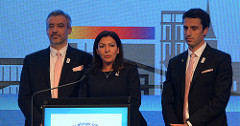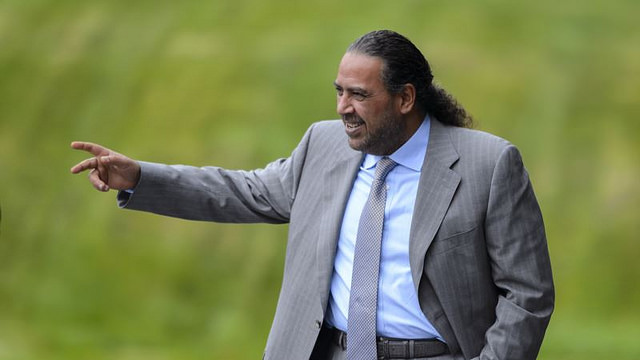The Paris 2024 media team, in anticipation in the coming days of both the French presidential election and the International Olympic Committee’s evaluation visit, undertook a media blitz of sorts, with bid leader Tony Estanguet quoted Monday in leading U.S. newspapers.
Talk about fake news.
There’s a (huge, and perhaps two-pronged) scandal perhaps waiting to erupt in the Olympic world, the latest twist possibly involving one of its most influential power brokers.
Olympic stories hardly take up newsprint in off years. Yet this is what’s being fed to readers as what matters?
Estanguet, to the LA Times:
“ … We want to reduce the involvement of the political world. They are there to support. But we decide where to put the Olympic village. We decide the global concept that has been there since the beginning.”
Estanguet, to USA Today, even bolder:
“We want to reduce the involvement of the political world. They are there to support. They are there to be tough. But we decide where to put the Olympic village. The sport movement will be responsible for delivering the Games.”
It’s easy enough here to knock the newspapers. Due diligence, please.
Beyond which, it’s the job of journalists to hold people in positions of authority accountable.
In that spirit, Mr. Estanguet’s remarks are good for a laugh.
It’s all well and good to say the “sport movement will be responsible for delivering the Games.”
Except for the basic fact that in France the sport movement is the government.
Even the bid itself is, you know, a government project.
If Mr. Estanguet is trying to draw a distinction — oh, look, the badminton team and his beloved canoers will be responsible for delivering the Olympic village — that would just be silly.
Indeed, as even the bid book points out, if Paris were to prevail there would be a delivery authority. It would be called SOLIDEO.
From the second of three books in the Paris 2024 candidature file:
“The delivery of the venues and other infrastructure projects needed to stage the Games will be the responsibility of an Olympic and Paralympic Delivery Authority (SOLIDEO). The SOLIDEO will also plan for the legacy of infrastructure investments. It will take the form of a public entity, reflecting the role of public authorities in funding and underwriting Games capital investments.”
Wow — a public entity. Not “the sport movement.”
All these things, and what’s really amiss in these stories is that while they may scratch a seeming mainstream media itch — oh, look, LA and Paris are involved in a bid race, and there’s that news hook in the May 7 French presidential race and the IOC visit in mid-May to both cities — these stories do little to no journalistic service whatsoever.
Because the news that matters in Olympic bidding circles is not whether Marine le Pen wins in France. The days of the head of state carrying an International Olympic Committee election — Putin in Guatemala in 2007, Tony Blair in Singapore in 2005 — are seemingly long gone.
The issue on the table now is not who is head of state of country X or Y. Instead:
It’s whether the IOC wants to keep going back to government-run bids that inevitably 1) produce cost overruns and 2) bad press for seven years, which then 3) further erodes taxpayer and official trust in the IOC and the broader movement, 4) which leads to the spectacle of cities dropping out repeatedly, 5) just like they have done over the past few years for the 2022 and 2024 bid cycles, 6) just like Stockholm did last week for 2026.
But, again, even that’s not the most pressing news.
For sure the bid process is broken and needs to be fixed. At issue is whether the IOC is going to do it — indeed, address all its business — in a calm fashion or amid crisis.
The signs increasingly point to crisis.
Over the weekend, stories flashed around the world suggesting that the influential IOC member Sheikh Ahmad al-Fahad al-Sabah of Kuwait is co-conspirator No. 2 in the criminal case of United States v. Richard Lai. The matter is in the Brooklyn federal courts.
The sheikh says he is innocent of any wrongdoing.
The Lai case directly relates to FIFA. Co-conspirator No. 1, as described in the court document, would appear to be Mohammed Bin Hammam, a Qatari billionaire who ran for the FIFA presidency in 2011.
The document describes co-conspirator No. 2 as a “high-ranking official of FIFA.” Since the document has become public, Sheikh Ahmad has resigned his FIFA posts.
According to the court document, co-conspirator No. 2 was also a high-ranking official of the Olympic Council of Asia. The sheikh heads OCA.
The sheikh is also president of the Assn. of the National Olympic Committees. Through that role, he oversees the distribution of hundreds of millions of dollars in what are called Olympic Solidarity funds — that is, monies that go from IOC headquarters to developing nations.
The sheikh travels within a closely held circle of trust. The court document describes co-conspirator No. 3 as a “high-ranking official of the OCA” as well as an official of the Kuwaiti soccer association.
Co-conspirator No. 4 was an OCA employee and No. 3’s assistant, the court document says.
The court document describes the transfers of a lot of money. Intriguingly, paragraph 31 describes wire transfers from accounts in Kuwait controlled by co-conspirator No. 3 or his assistants at the OCA.
A few things are clear:
— Prosecutors now hold the cards in dealing with Mr. Lai.
— The court file is mysteriously thin for a case that has come to resolution with a guilty plea. Mr. Lai has yet to be sentenced. He clearly has a significant incentive to tell what he knows.
— The obvious question: what does he know, and in particular about co-conspirators No. 2 and 3?
In Olympic circles, the sheikh is believed to have played a key role in helping to orchestrate the triple play that marked the 2013 IOC assembly in Buenos Aires — the elections of Thomas Bach as president and Tokyo as 2020 site plus the return of wrestling to the Olympic program.
In the American courts, the FIFA matter has for months now been that — a FIFA matter. Now it threatens to slide into the Olympic space, and in a powerful way.
The FIFA inquiries, it is important to note, were launched during the Obama years. The Brooklyn office used to be headed by Loretta Lynch. Ms. Lynch went on to be the attorney general. It’s fascinating that this matter has not drawn the significant attention of the Trump people in their first 100 days, and worth asking if it will now — or anytime soon, because if it the status remains quo prosecutors in Brooklyn will likely just keep keeping on.
At any rate:
Already in recent weeks, the IOC member Frankie Fredericks has been connected to the inquiry being led by the authorities in France tied to Lamine Diack, the former head of the international head of the international track and field federation.
Diack and Bach were also allies of longstanding.
Diack was known to have remarked before the assembly in Buenos Aires that the triple play was going to happen just as it did — Bach, Tokyo, wrestling.
It is believed in Olympic circles that the French authorities know more, and about more IOC members. Unclear is whether whatever they know will become public in the weeks ahead.
Uncertain, too, is what is known at the Chateau de Vidy, the IOC’s lakeside headquarters in Lausanne, Switzerland, about the scope and nature of the inquiries in France and Brooklyn and how, if at all, the two mesh. The Fredericks matter suggests that the Americans and French are sharing, at the least, wire transfer records.
To be obvious:
The Salt Lake City scandal of the late 1990s came about because IOC members could literally get their hands on what we in the journalism business called “inducements” — that is, anything and everything from college scholarships for their kids to parts for cars to cash and much, much more.
The investigations in France and Brooklyn threaten the IOC, and far more insidiously. As the Lai case underscores, a forensic accountant and a wire transfer record make for black-and-white reading.
In this context, yet again, it is worth recalling what the then-president of the organization, Marius Vizer, said at the 2015 SportAccord conference in Sochi:
"History demonstrated that all the empires who reached the highest peaks of development never reformed on time and they are all headed for destruction. The IOC system today is expired, outdated, wrong, unfair and not at all transparent."
The first person to lead the charge against Vizer then was — Diack.
It is worth emphasizing that co-conspirators No. 2, 3 and 4 in the Lai matter have not been charged with anything, and that in the American system the vigorous presumption of innocence prevails.
It is also worth emphasizing that optics matter, particularly in the Olympic space, which is why the likes of Stockholm are out for 2026, because the IOC has over the past several years considerably forfeited the trust of taxpayers and officials.
Here is where the reasonable person asks the reasonable question:
Why would that be?



